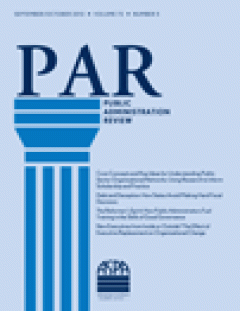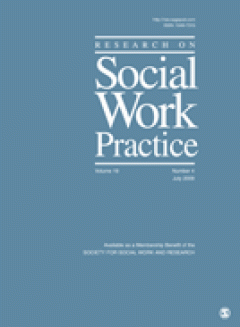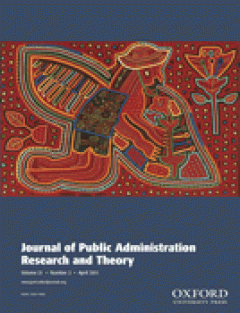Filter by

State Performance-Based Budgeting in Boom and Bust Years : An Analytical Fram…
The authors examine the track record of applying performance-based budgeting (PBB) across three time periods within a sample of U.S. state governments: (1) throughout the 1990s, (2) in the early 2000s, and (3) during the Great Recession. State-level PBB is analyzed according to four elements: (1) the development of performance measures, (2) its applicability to budgeting and management processe…
- Edition
- Volume 71, Issue 3, pages 370–388, May/June 2011
- ISBN/ISSN
- 00333352
- Collation
- -
- Series Title
- Public Administration Review
- Call Number
- -

PBB in American Local Governments : It's More than a Management Tool
Despite academic findings that performance information seldom is used in appropriations decisions, many professional organizations and governments continue to press for integrating performance information into local public management, planning, and budgeting processes. Is it possible to reconcile such inconsistencies? Looking beyond the executive�legislative relationship and departmental approp…
- Edition
- Volume 71, Issue 3, pages 391–401, May/June 2011
- ISBN/ISSN
- 00333352
- Collation
- -
- Series Title
- Public Administration Review
- Call Number
- -

Assembling E-Government Research Designs : A Transdisciplinary View and Inter…
There is a growing recognition in the field of e-government that improving the quality and impact of research requires taking into account their complex contexts and drawing on more interdisciplinary and collaborative research. Limited attention so far has been directed toward the conduct of such research, particularly in contract-based research arrangements for developing e-government policy. …
- Edition
- Volume 71, Issue 3, pages 405–413, May/June 2011
- ISBN/ISSN
- 00333352
- Collation
- -
- Series Title
- Public Administration Review
- Call Number
- -

Politics of E-Government : E-Government and the Political Control of Bureaucracy
This case study reports an innovative e-government experiment by a local government in Seoul, South Korea�Gangnam-gu. A new local political leadership in Gangnam made strategic use of e-government applications to exert greater political control over the local civil service bureaucracy. The authors find that e-government applications possess political properties that can be applied effectively b…
- Edition
- Volume 71, Issue 3, pages 414–424, May/June 2011
- ISBN/ISSN
- 00333352
- Collation
- -
- Series Title
- Public Administration Review
- Call Number
- -

Uses of Public Participation Geographic Information Systems Applications in E…
Despite significant growth in public participation GIS (PPGIS) literature since the 1990s, little engagement by e-government scholars is evident in the extensive scholarly PPGIS debates. To fill this void, recent trends in PPGIS adoption by local governments are analyzed. Three waves of GIS are identified: desktop GIS, web GIS, and the Geospatial Web 2.0 platform. Such technological advancement…
- Edition
- Volume 71, Issue 3, pages 425–434, May/June 2011
- ISBN/ISSN
- 00333352
- Collation
- -
- Series Title
- Public Administration Review
- Call Number
- -

Information Technology and Organizational Morphology : The Case of the Korean…
This study explores the effects of information technology (IT) in terms of longitudinal changes in organizational structures at the central government level. Interestingly, although IT has increased the ratio of middle managers to subordinates, the number of middle managers has not changed radically and, in some cases, has steadily increased, while the proportion of lower-level employees has de…
- Edition
- Volume 71, Issue 3, pages 435–443, May/June 2011
- ISBN/ISSN
- 00333352
- Collation
- -
- Series Title
- Public Administration Review
- Call Number
- -

Testing the Development and Diffusion of E-Government and E-Democracy : A Glo…
E-government uses information and communication technology to provide citizens with information about public services. Less pervasive, e-democracy offers greater electronic community access to political processes and policy choices. Few studies have examined these twin applications separately, although they are widely discussed in the literature as distinct. The authors, Chung-pin Lee of Tamkan…
- Edition
- Volume 71, Issue 3, pages 444–454, May/June 2011
- ISBN/ISSN
- 00333352
- Collation
- -
- Series Title
- Public Administration Review
- Call Number
- -

The New Policy World of Cybersecurity
As government agencies, private sector corporations, the military, and even retail shoppers shift their activities to the Internet, cybersecurity becomes increasingly important. Past presidential administrations recognized that cybersecurity necessitates a comprehensive national policy to protect electronically transmitted and stored information from intrusion. But so far, development of a cohe…
- Edition
- Volume 71, Issue 3, pages 455–460, May/June 2011
- ISBN/ISSN
- 00333352
- Collation
- -
- Series Title
- Public Administration Review
- Call Number
- -

Left High and Dry? Climate Change, Common-Pool Resource Theory, and the Adapt…
Efforts to reduce greenhouse gas emissions are falling far short of what a consensus of scientists argues is necessary to avoid potentially catastrophic increases in the mean global temperature. Increasingly, attention is devoted to understanding the vulnerability and adaptability of social and ecological systems to climate change in particular areas of the world. In the Western United States a…
- Edition
- Volume 71, Issue 3, pages 461–470, May/June 2011
- ISBN/ISSN
- 00333352
- Collation
- -
- Series Title
- Public Administration Review
- Call Number
- -

Effects of Correctional-Based Programs for Female Inmates : A Systematic Review
Objective: To examine the effectiveness of interventions for incarcerated women. Method: The researchers use a two-model system: the risk-reduction model for studies analyzing interventions to reduce recidivism rates, and the enhancement model for studies that target psychological and physical well-being. Results: Incarcerated women who participate in substance abuse interventions appear less l…
- Edition
- Vol. 21 no. 1, January 2011.pp. 15-31
- ISBN/ISSN
- 10497315
- Collation
- -
- Series Title
- Research on Social Work Practice
- Call Number
- -

Interventions to Prevent and Reduce Cyber Abuse of Youth : A Systematic Review
Objectives: The Internet has created a new communication tool, particularly for young people whose use of electronic communication is exploding worldwide. While there are many benefits that result from electronic-based communication, the Internet is concurrently a potential site for abuse and victimization. Methods: This paper systematically reviews the effectiveness of cyber abuse intervention…
- Edition
- Vol. 21 no. 1, January 2011.pp. 5-14
- ISBN/ISSN
- 10497315
- Collation
- -
- Series Title
- Research on Social Work Practice
- Call Number
- -

Effects of Cognitive Enhancement Therapy on Employment Outcomes in Early Schi…
Objective: To examine the effects of psychosocial cognitive rehabilitation on employment outcomes in a randomized controlled trial for individuals with early course schizophrenia. Method: Early course schizophrenia outpatients (N = 58) were randomly assigned to cognitive enhancement therapy (CET) or an enriched supportive therapy (EST) control and treated for 2 years. Comprehensive data on cogn…
- Edition
- Vol. 21 no. 1, January 2011.pp. 32-42
- ISBN/ISSN
- 10497315
- Collation
- -
- Series Title
- Research on Social Work Practice
- Call Number
- -

A Telephone Intervention for Substance-Using Adult Male Perpetrators of Intim…
Objective: To preliminarily evaluate telephone-delivered motivational enhancement therapy (MET) in motivating unadjudicated and nontreatment seeking intimate partner violence (IPV) perpetrators, who also use substances, to self-refer into treatment. Method: 124 adult men were recruited via a multimedia marketing campaign and were randomly assigned to the intervention (MET) or comparison group f…
- Edition
- Vol. 21 no. 1, January 2011.pp. 43-56
- ISBN/ISSN
- 10497315
- Collation
- -
- Series Title
- Research on Social Work Practice
- Call Number
- -

Realist Evaluation in Wraparound : A New Approach in Social Work Evidence-Bas…
Objectives: The purpose of this study was to develop a realist evaluation paradigm in social work evidence-based practice. Method: Wraparound (at Gateway-Longview Inc., New York) used a reliable outcome measure and an electronic database to systematically collect and analyze data on the interventions, the client demographics and circumstances, and the outcomes. Results: Research designs (e.g., …
- Edition
- Vol. 21 no. 1, January 2011.pp. 57-64
- ISBN/ISSN
- 10497315
- Collation
- -
- Series Title
- Research on Social Work Practice
- Call Number
- -

Predictors of Adopting Motivational Enhancement Therapy
Substance abuse counselors have shown limited success in adopting evidence-based practices (EBPs). The purpose of this paper is to identify the barriers and facilitators of adopting an EBP called motivational enhancement therapy (MET). One hundred thirty-six predominantly female (60%) African American (68%) addiction counselors representing over 40 agencies completed surveys before and after pa…
- Edition
- Vol. 21 no. 1, January 2011.pp. 65-76
- ISBN/ISSN
- 10497315
- Collation
- -
- Series Title
- Research on Social Work Practice
- Call Number
- -

An Effective Model for Continuing Education Training in Evidence-Based Practice
This study utilized a replicated one-group pretest-posttest design with 3 month follow-up to evaluate the impact of a one-day continuing education training on the evidence-based practice (EBP) process with community practitioners (N = 69). Outcome measures assessed the level of workshop participants� familiarity with the EBP process, their attitudes toward the EBP process, their perceived feasi…
- Edition
- Vol. 21 no. 1, January 2011.pp. 77-87
- ISBN/ISSN
- 10497315
- Collation
- -
- Series Title
- Research on Social Work Practice
- Call Number
- -

Measuring Parenting Practices Among Parents of Elementary School-Age Youth
Objectives: The objective of this study is to establish the factor structure of the Alabama Parenting Questionnaire (APQ), an instrument designed to measure parenting practices among parents of elementary school children. Methods: Exploratory (EFA) and confirmatory factor analytic (CFA) procedures are used to validate the APQ with 790 parents of children, ages 6�10. Results: Three subscales eme…
- Edition
- Vol. 21 no. 1, January 2011.pp. 88-97
- ISBN/ISSN
- 10497315
- Collation
- -
- Series Title
- Research on Social Work Practice
- Call Number
- -

A Conceptually Based Scale to Measure Consumers’ Treatment Motivation
Objectives: The objective of this work was to assess the reliability and validity of the Treatment Motivation Questionnaire� Revised (TMQ-R) in people with serious mental illness (SMI). Method: A large sample of consumers of mental health services (n = 469) were administered the TMQ-R. Results: The factor structure specified in previous research did not fit the data well. However, a five-factor…
- Edition
- Vol. 21 no. 1, January 2011.pp. 98-105
- ISBN/ISSN
- 10497315
- Collation
- -
- Series Title
- Research on Social Work Practice
- Call Number
- -

Validation of the Evidence-Based Practice Process Assessment Scale
Objective: This report describes the reliability, validity, and sensitivity of a scale that assesses practitioners� perceived familiarity with, attitudes of, and implementation of the evidence-based practice (EBP) process. Method: Social work practitioners and second-year master of social works (MSW) students (N = 511) were surveyed in four sites to assess the scale�s internal consistency re…
- Edition
- Vol. 21 no. 1, January 2011.pp. 106-118
- ISBN/ISSN
- 10497315
- Collation
- -
- Series Title
- Research on Social Work Practice
- Call Number
- -

Management Innovation and Organizational Performance : The Mediating Effect o…
Management innovations (MIs) are widely adopted, but their influences on organizational performance are little researched in public settings. Positing that the MI-performance relationship is complex and is conditional over other characteristics of the organization, we examine the influence of MI on organizational performance both directly and indirectly through performance management (PM). PM i…
- Edition
- Vol. 21, Number 2, April 2011.pp. 367-386
- ISBN/ISSN
- 10531858
- Collation
- -
- Series Title
- Journal of Public Administration Research and Theory
- Call Number
- -
 Computer Science, Information & General Works
Computer Science, Information & General Works  Philosophy & Psychology
Philosophy & Psychology  Religion
Religion  Social Sciences
Social Sciences  Language
Language  Pure Science
Pure Science  Applied Sciences
Applied Sciences  Art & Recreation
Art & Recreation  Literature
Literature  History & Geography
History & Geography